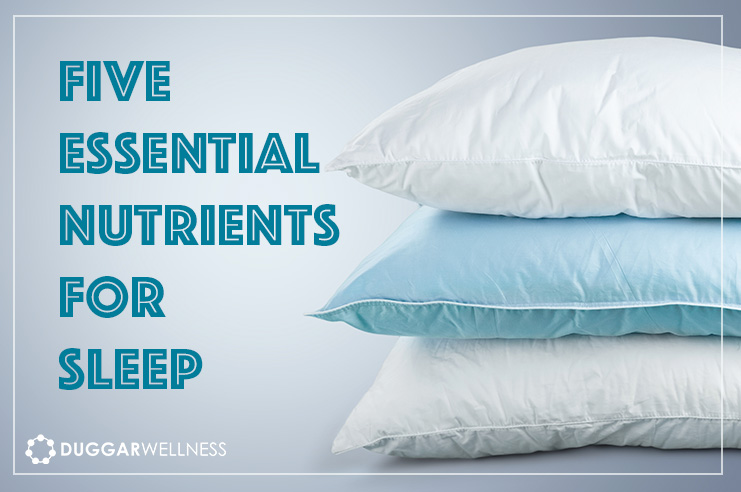Sleep is absolutely essential for our well-being. I often meet with clients who haven’t ever thought that sleep should be a top priority in order to create the health that they are searching for. There are so many reasons we should make sleep a priority and along with that, there are many things that we can eat that help our body to relax and sleep better.
How Much Sleep Do I Need?
The amount of sleep a person needs depends on many factors, here are some general guidelines from the National Sleep Foundation:
Newborns (0-3 months) 14-17 hours a day
Infants (4-11 months) require about 12-15 hours a day
Toddlers (1-2 years) require about 11-14 hours a day.
Pre-school children (3-5 years) require 10-13 hours a day.
School-age children (6-13 years) require 9-11 hours a day.
Teenagers (14-17 years) need about 8-10 hours on average.
Young Adults (18-25 years) need 7 to 9 hours a night
Adults (26-64 years) need 7 to 9 hours a night
Older Adults (65+ years) need 7 to 8 hours a night
Why sleep matters
Being sleep deprived impairs our judgment, lessens our reaction time, creates memory problems, can lead to depression, weakens our immune system, can make us more accident-prone, and increases our perception of pain. Prolonged poor sleep can even add to the risk of heart disease, obesity, and diabetes.
Strategies for better sleep
There are many solutions out there to help us sleep better. Many people feel like they need to turn to pharmaceutical sleep aids. Let me make a few suggestions that are more effective and don’t have any negative side effects.
One of the most effective strategies is to develop a bedtime routine that helps you set the stage for a good night’s sleep, you can find a list of our top 10 sleep strategies here to help you create the perfect routine.
Another option is to take a look at your diet. This may not have crossed your mind before but there are certain nutrients that play an essential role in regulating your sleep. Including these nutrients in your diet through your food choices to enjoy improved health and sleep.
5 Essential Nutrients for Sleep
Magnesium
Magnesium is a vital component for over 300 biochemical enzymes in our body. Magnesium is essential for many physiological functions including; hydration, energy production, muscle relaxation, deactivation of adrenaline and, sleep.
Having sufficient stores of magnesium doesn’t guarantee a good night’s rest, however, having low magnesium levels will almost certainly contribute to poor sleep quality.
Magnesium is vital for the function of GABA receptors, which exist across all areas of the brain and nervous system. GABA is a calming neurotransmitter that the brain requires to switch off; without it, we remain tense, our thoughts race and we lie in bed staring at the ceiling.
Food Sources of Magnesium
These include leafy green vegetables, bananas, avocado, nuts and seeds, beans and lentils, raw cacao, quinoa, buckwheat, wild-caught fish, oats, and brown rice.
You can also soak it in. Taking a relaxing bath in magnesium salt, Epsom salt, is a perfect way to get magnesium, especially for those suffering from poor gut health. The skin is the body’s largest organ. It has the ability to absorb nutrients as an effective way to deliver them to the body.
Calcium
Calcium contains an amino acid called ‘tryptophan’ which is responsible for producing melatonin, that hormone induces and maintains a restful sleep.
Calcium is directly related to our cycles of sleep. In one study, published in the European Neurology Journal, researchers found that calcium levels in the body are higher during some of the deepest levels of sleep, such as the rapid eye movement (REM) phase. The study concluded that disturbances in sleep, especially the absence of REM deep sleep or disturbed REM sleep, are related to a calcium deficiency.
Eating a diet of calcium-rich foods can help you get more undisturbed sleep.
Food Sources of Calcium
Kale, sardines, yogurt or kefir, broccoli, watercress, bok choy, white beans, almonds, dried figs, black-eyed peas, citrus fruits, sesame seeds, sunflower seeds, sweet potatoes, sea vegetables.
Vitamin D
Vitamin D is important for ensuring a healthy sleep. A deficiency of this vitamin is directly associated with disrupted sleep. Researchers have found that having adequate vitamin D levels will improve sleep and lessen sleep disturbances.
Sources of Vitamin D
Sunlight, salmon, tuna, swordfish, and sardines, green peas, hemp seeds, mushrooms, and eggs.
Selenium
Selenium is a trace mineral, so you don’t need a lot of it, but if your body is deficient in it, you may experience sleep abnormalities.
Selenium is crucial for producing antioxidants in our body, protecting the health of our cells and is key for a healthy brain and thyroid.
Food sources of selenium
Brazil nuts, sardines, tuna, shellfish, grass-fed beef, spinach, eggs, chicken, liver, and garlic.
Potassium
Potassium is an important nutrient and can have an effect on our ability to stay asleep.
Potassium also promotes healthy heart function, regulates blood pressure, and reduces muscle contractions and spasms that may disrupt sleep.
Food sources of potassium
Bananas, avocados, spinach, sweet potatoes, mushrooms, dried fruit, nuts and seeds, lima beans, and tomatoes
Conclusion
Overall, people who eat a well-balanced diet full of fresh vegetables, fruit, healthy fats, and quality proteins enjoy the benefits of healthy sleep patterns. And a good night’s sleep will keep you feeling vital and energized throughout the day.
 140 N Main, Bountiful, UT 84010
140 N Main, Bountiful, UT 84010  801-677-7878
801-677-7878


